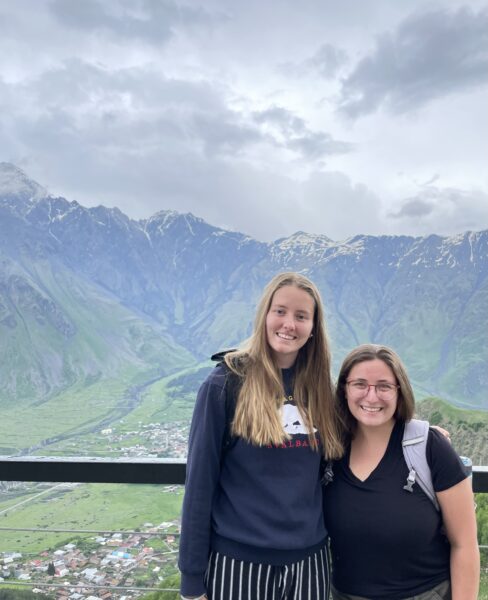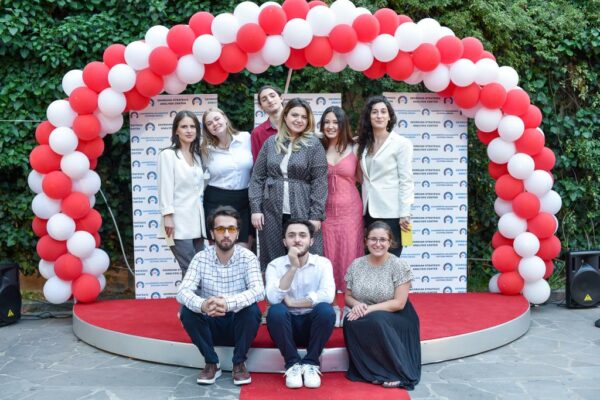From Interviews to Insights: Understanding why the Georgian Military Served in Iraq and Afghanistan
The Global Research Institute’s Summer Fellows Program provides international experiential learning opportunities to W&M students. This post is one installment of a series highlighting the 2022 Fellows’ key discoveries and formative experiences.
By Abby Stern ’24
From interviews with Georgian veterans to conversations with Russian expats to dinners with Ukrainian refugees, my time in Tbilisi was nothing short of spectacular. As someone who had never left the country before, the prospect of traveling so far away to an Eastern European country that many are unfamiliar with was intimidating. Although it was not a small feat, I had a wonderful time conducting research with four fellow William & Mary students in collaboration with Professor Daniel Maliniak. Our research focused on understanding the motivations behind the Georgian military serving in both the Iraq and Afghanistan wars, and on determining the state of domestic politics in the country.
Katrine, another GRI Summer Fellow I was conducting research with, and I landed in Georgia at the end of May. After getting used to the eight hour time difference, we set out into the city to explore. We visited the Mother of Georgia statue that overlooked the city, ate delicious Khachapuri, took pictures in front of the leaning clock tower and saw many stray dogs. After spending a day getting acquainted with the city and celebrating the country’s independence on Rustaveli Avenue, we began digging into our research by creating a list of possible interviewees. After creating the list, we interviewed Georgian politicians, veterans, and academics at a variety of neutral locations such as offices, coffee shops, and restaurants. We had a rocky start as the majority of the people we reached out to were unresponsive, but through our own connections we were able to schedule our initial interviews, where we were connected with even more potential interviewees. Aliia Woodworth and Daniella Marx, the final GRI Summer Fellows on this team, arrived in the beginning of June with a student veteran Maia Earl, and from there the research blossomed. The five of us conducted over 40 interviews during our time there, created a network of people, and developed a more thorough understanding of Georgian politics.

Katrine Westgaard and I traveled to the Kazbegi region in the Caucus mountains on a personal daytrip.
Our research highlighted the variety of motivations for Georgians to serve in Iraq and Afghanistan — including the monetary benefit, a strong sense of nationalism, the combat experience gained, and the larger goal of NATO/EU membership. In addition to the study of military relations, a few additional interesting research questions came up through our research, such as: the role of the military in Georgian society, the likelihood of NATO/EU membership in the near future, the impact of the war in Ukraine, where reform is necessary in Georgia, and the repercussions of the 2008 war. These are all areas where the research can be expanded in the future.
In addition to the interviews we conducted, we connected with a Georgian think tank called the Georgian Strategic Analysis Center, or GSAC. GSAC leads projects in the country and region focused on the development of Georgian democracy. Four of the five researchers on our team, including myself, joined GSAC as academic associates. This provided us with the opportunity to develop deep, meaningful connections with those conducting important policy work in the country. We assisted in the planning of two projects GSAC is hosting. The first is a conference that brings together women from the occupied territories of Abkhazia and South Ossetia to provide educational and legal support. The second is a project that provides psychological, legal, and educational support to Russian migrants in Georgia. Our assistance with these projects included providing feedback on the details of the projects, writing grant proposals, and brainstorming opportunities for project expansion.

Katrine Westgaard, Daniella Marx, and Aliia Woodworth, all interns at the Georgian Strategic Analysis Center (GSAC) for a summer, attended a farewell event for the Turkish ambassador. This photo is a photo of us with our fellow GSAC summer interns and supervisor.
Outside of our time conducting research and working with GSAC, I enjoyed the weekends in Georgia by spending time exploring the country. One of my most memorable experiences is hiking a trail in the Caucasus mountains, where I saw wild horses and fields of flowers. Katrine and I also took a day trip to Kazebgi, a northern region in Georgia that is surrounded by the mountains, where we saw the beautiful Gergeti Trinity Church. We also traveled to Kakheti or what many refer to as the “wine region.” There, we visited an array of historical sites and monasteries. Finally, we visited many other historic sites throughout our month there, such as the Holy Trinity Cathedral of Tbilisi, Kartlis Deda monument, and the Narikala Fortress.
My time in Georgia was life-changing. It provided me with the opportunity to conduct field research as an undergraduate, expand my knowledge of a topic I had been researching for over a year, and connect with wonderful people. Professor Daniel Maliniak will continue collaborating with students to perform analysis on the data collection in Georgia and to expand the research project further.
Comments are currently closed. Comments are closed on all posts older than one year, and for those in our archive.


Hey!
Wow, what an experience I had reading this post. My ancestors are from Georgia. As I was reading, I felt like I was right there with you on your trip. I too, cannot wait to visit Georgia and experience some of what you guys have had. By the way, I speak Russian and Turkish, so seeing you all attend the event for the Turkish ambassador is so cool. Thank you for this amazing post!